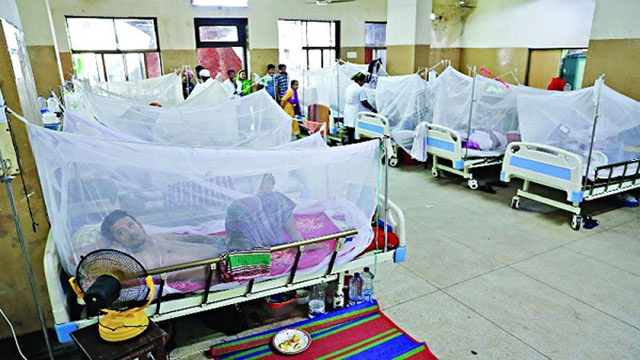The fight to control Aedes mosquito population has largely remained ineffective in the absence of a vector control policy, resulting in the rise of viral dengue fever in the country over the past few years.
More than one lakh people were infected with dengue and at least 179 died in 2019, prompting the government to initiate the process of formulating a comprehensive policy.
But it has remained on the drafting table for over one and half years, leaving the battle against the mosquito-borne disease and controlling the Aedes population in disarray. The Aedes mosquito is the vector of dengue virus.
Experts said there are some guidelines for mosquito-borne diseases like malaria and kala-azar in the country, but without an integrated vector control policy and a research centre, the government has failed to control Aedes mosquito population.
"A national vector control guideline and its proper implementation is necessary to control Aedes mosquito population," Prof Kabirul Bashar, an entomologist of Jahangirnagar University, told recently.
He said a separate institute is needed to conduct research and regularly share updates with the agencies engaged in eradicating Aedes.
"The institute will carry out research on all kinds of vectors like sun fly [which spreads kala-azar] and bed bugs, not only mosquitoes," he said.
Manzur Chowdhury, entomologist and former president of Zoological Society of Bangladesh, said they had suggested the government formulate an integrated vector management policy keeping the Mosquito Control Department under the Ministry of Local Government, Rural Development and Cooperatives (LGRD) central to it.
The network of the department will be extended to the district level for research, surveillance and training, he said, adding that it will find out which serotype of Aedes mosquitos is active now.
Through identifying the serotype, it is possible to say whether the country will face an epidemic of dengue, and the authorities concerned will be able to take necessary steps following this, the entomologist opined.
The Mosquito Control Department in Dhaka is currently in a shabby state. Established in 1948 to eradicate malaria, it got its 338 contingency workers regularised under the health ministry in 1972.
It was a vibrant body back then and had done extensive work, including conducting drives against mosquito, its larvae and breeding grounds, along with research relating to mosquito control activities in Dhaka.
However, once the department was brought under LGRD in 1981-1982 and subsequently under the direct preview of then unified Dhaka City Corporation, it lost the essence it was empowered for, said one of its officials preferring anonymity.
Most of the manpower now work under the two Dhaka city corporations and their office premises are now being used as a warehouse of insecticide drums.
In December 2019, a top official of the LGRD ministry said they would prepare a vector management policy keeping in mind modernising the Mosquito Control Department.
The department would carry out research on vectors and make plans to manage them accordingly. These planning and research outcomes would be provided to all city corporations, districts, upazilas and union parishads, he told that time.
He also said they would soon prepare a vector management policy to research and control Aedes mosquito population.
Contacted last week, LGRD Minister Md Tazul Islam said they have prepared a draft and it is at the final stage. Once the draft is finalised, they will discuss it at an inter-ministerial meeting.
"The work to control Aedes mosquitoes is going on through different steps including larvicide and adulticide," added the minister.
Deputy Secretary of Local Government Division Numeri Jaman said after finalising the draft, they will send it to the public administration and finance ministries for their opinion.
"So, it will take time and we are working on it," he said.
Experts fear if extensive measures are not taken under proper guidelines to control Aedes mosquitoes, the rise of dengue cases amid the pandemic might put already strained health sector under tremendous pressure.
They say dengue has a common trend of increasing in every alternate year, and the situation witnessed in 2019 may come back.
Last year, 1,405 cases of dengue were reported and the number of deaths was as low as nine.
This year, at least 565 people have been hospitalised with dengue till 8:00am yesterday -- 29 got admitted in 24 hours since Tuesday morning, according to the report of the DGHS control room.





